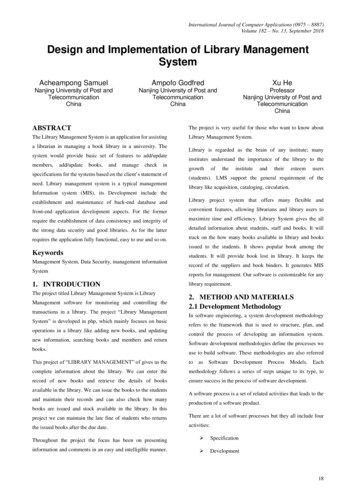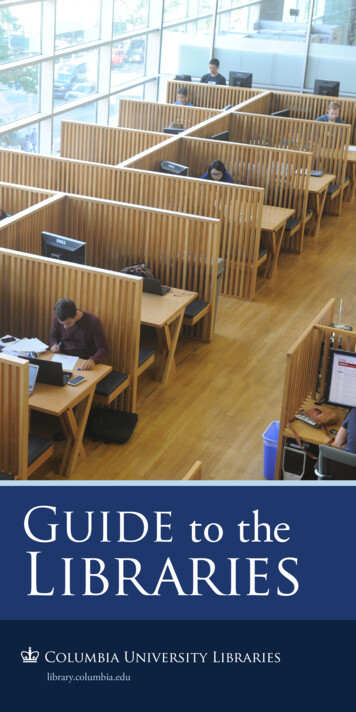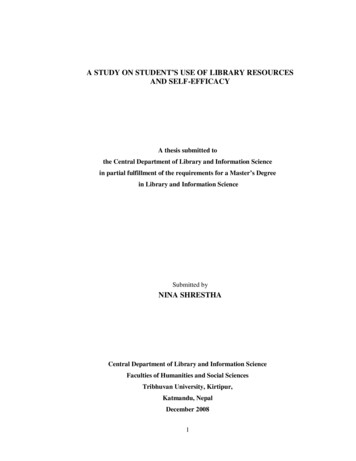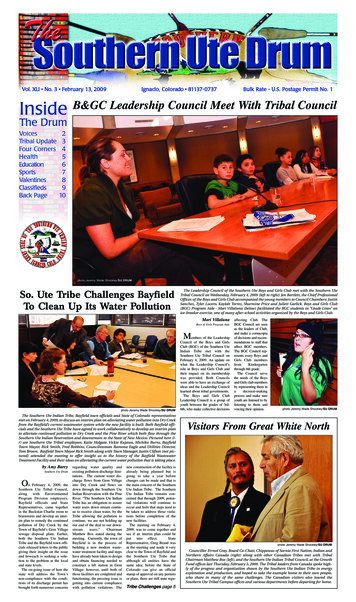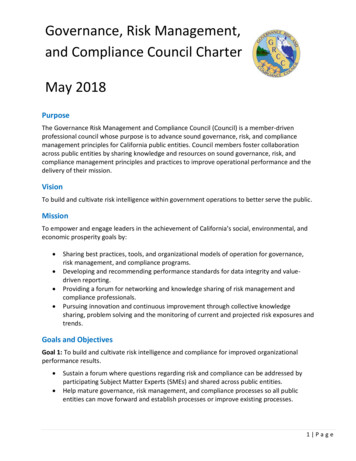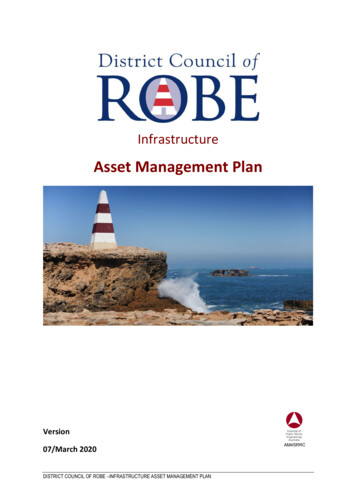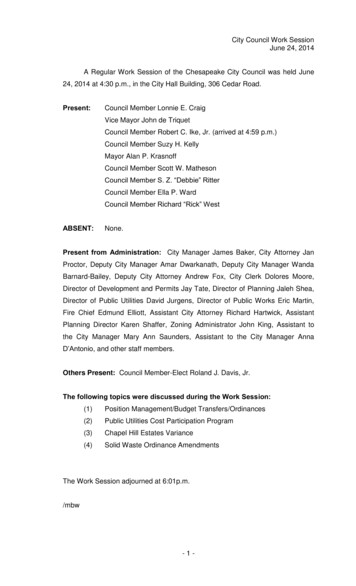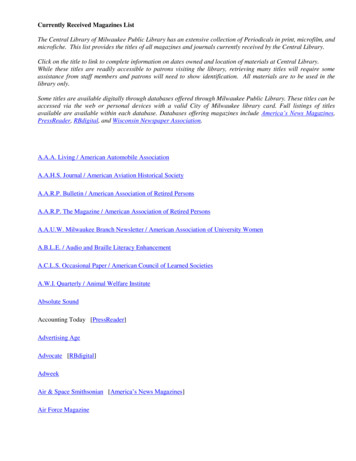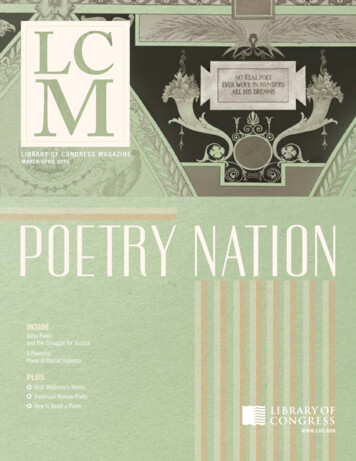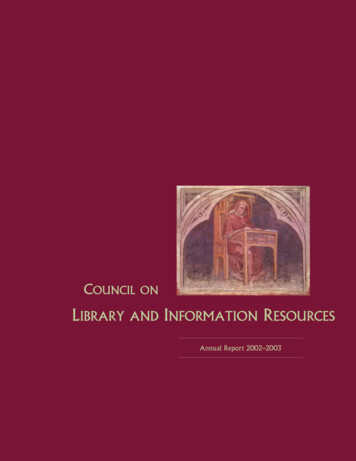
Transcription
COUNCILLIBRARYONAND INFORMATIONRESOURCESAnnual Report 2002–2003
DIRECTORS (ASOF JUNE30, 2003)Edward AyersUniversity of VirginiaFrancis X. BlouinThe University of MichiganJerry D. CampbellUniversity of Southern CaliforniaStanley A. ChodorowUniversity of CaliforniaNorman FainsteinConnecticut CollegeNils HasselmoAssociation of American UniversitiesMichael Ann HollySterling and Francine Clark Art InstitutePaula T. KaufmanUniversity of Illinois at Urbana-ChampaignSusan KentLos Angeles Public LibraryPaul LeClercNew York Public LibraryDeanna B. MarcumCouncil on Library and Information ResourcesHerman PabbruweBook TiesCharles PhelpsUniversity of RochesterDan TonkeryEBSCO Information ServicesJames E. Williams, IIUniversity of Colorado at BoulderCelia Ribeiro ZaherFundação Biblioteca Nacional Ministério daCultura, BrazilThe Council on Library and Information Resources (CLIR) grewout of the 1997 merger of the Commission on Preservation and Access(CPA) and the Council on Library Resources (CLR). Over the years,CPA and CLR, in partnership with libraries, archives, and other information providers, advocated collaborative approaches to preserving thenation’s intellectual heritage and strengthening the many componentsof its information system. CLIR was founded to continue this traditionof support for a national information system and a seamless web ofinformation resources, of which all libraries and archives are a part.The convening role is central to CLIR’s mission. CLIR brings togetherexperts from around the country and around the world and asks themto turn their intelligence to the problems that libraries, archives, andinformation organizations face as they integrate digital resources andservices into their well-established print-based environments.CLIR urges individuals to look beyond the immediate challenges andimagine the most desirable outcomes for the users of libraries andarchives—to be rigorously practical and to dream.Cover image: Anonymous, 15th century. “The Learned Man," from the sign ofSagittarius, fresco. Palazzo della Ragione, Padua, Italy.Photo: Scala/Art Resource, NY.
2002–2003COUNCIL ON LIBRARYAND INFORMATION RESOURCESANNUAL REPORT 2002–2003ContentsAcknowledgments . iiStaff.ivLetter from the Chairman . 1Message from the President . 3The Programs. 8Resources for Scholarship . 8Preservation Awareness . 9Digital Libraries.11Economics of Information. 14Leadership. 14International Developments. 16Outreach . 18Publications. 19Advisory Groups. 21Grants and Contracts. 24Financial Statements . 28ANNUAL REPORTi
ACKNOWLEDGMENTSThe following provide crucial support for the activities and programs ofthe Council on Library and Information Resources:SponsorsAgnes Scott CollegeAlbion CollegeAmherst CollegeArizona State University LibraryAssociation of American PublishersAuburn University LibraryBates CollegeBerea CollegeBibliothéque de l’Université LavalBibliothéque de l’Université of MontréalBoston CollegeBoston Public LibraryBowdoin CollegeBrigham Young UniversityBrown University LibraryBryn Mawr CollegeBucknell UniversityCalifornia Digital LibraryCarleton CollegeCarnegie Library of PittsburghCarnegie Mellon UniversityCase Western Reserve UniversityCoalition for Networked InformationColby CollegeColgate UniversityCollege of CharlestonCollege of Wooster LibrariesColorado CollegeColumbia UniversityConnecticut CollegeCornell UniversityDartmouth CollegeDavidson CollegeDenison UniversityDuke UniversityEarlham CollegeEmory UniversityFranklin & Marshall CollegeGeorgetown UniversityGeorgia Institute of TechnologyGettysburg CollegeGrinnell CollegeGustavus Adolphus CollegeHamilton CollegeHampton UniversityHarvard University LibraryHaverford CollegeHope CollegeIndiana UniversityIowa State UniversityJohns Hopkins UniversityJSTORKalamazoo CollegeKenyon CollegeLafayette CollegeLake Forest CollegeiiLehigh UniversityLibrary of CongressLinda Hall LibraryLinfield CollegeMacalester College LibraryManhattan CollegeMarquette UniversityMassachusetts Institute of TechnologyMcGill University LibrariesMercer UniversityMiami UniversityMichigan State UniversityMiddlebury CollegeMills CollegeMississippi State UniversityMount Holyoke CollegeNational Agricultural LibraryNational Initiative for a NetworkedCultural HeritageNational Library of MedicineNew York UniversityNorth Carolina State UniversityNortheastern UniversityNorthwestern University LibrariesOberlin College LibraryOregon State UniversityPrinceton University LibraryPurdue University LibraryReed CollegeRhodes CollegeRice UniversityRollins CollegeRutgers University LibrarySaint Lawrence UniversitySchreiner UniversitySimmons College LibrariesSkidmore CollegeSmith CollegeSmithsonian Institution LibrariesSoutheastern Library Network, Inc.Southern Illinois University LibraryStanford UniversityState University of New York at AlbanyState University of New York at BuffaloState University of New York at StonyBrook LibrarySwarthmore CollegeSyracuse UniversityTemple University LibraryThe Catholic University of AmericaThe Claremont CollegesThe New York Public LibraryThe Ohio State University LibrariesThe Pennsylvania State UniversityTrinity College LibraryTulane UniversityCouncil on Library and Information ResourcesUnion CollegeUniversity of AlabamaUniversity of AlbertaUniversity of ArkansasUniversity of California, BerkeleyUniversity of California, DavisUniversity of California, IrvineUniversity of California, Los AngelesUniversity of California, San DiegoUniversity of California, Santa BarbaraUniversity of Chicago LibraryUniversity of Colorado at BoulderUniversity of ConnecticutUniversity of Delaware LibraryUniversity of Florida LibrariesUniversity of Georgia LibrariesUniversity of Hawaii LibraryUniversity of Illinois at Urbana-ChampaignUniversity of Illinois, ChicagoUniversity of Iowa LibrariesUniversity of Kansas LibrariesUniversity of KentuckyUniversity of MaineUniversity of Maryland at College ParkUniversity of Massachusetts LibrariesUniversity of MiamiUniversity of MichiganUniversity of MinnesotaUniversity of MissouriUniversity of North Carolina at Chapel HillUniversity of Notre DameUniversity of OregonUniversity of PennsylvaniaUniversity of RichmondUniversity of South FloridaUniversity of Southern CaliforniaUniversity of St. ThomasUniversity of TennesseeUniversity of Texas at AustinUniversity of Texas at El PasoUniversity of TorontoUniversity of UtahUniversity of VirginiaUniversity of WashingtonVassar College LibrariesVirginia Polytechnic Institute and StateUniversityWashington and Lee UniversityWashington State UniversityWashington University LibrariesWellesley CollegeWesleyan UniversityWheaton CollegeWhitman CollegeWilliams CollegeYale University Library
Foundation and Corporate SupportAlfred P. Sloan FoundationThe Andrew W. Mellon FoundationThe Atlantic PhilanthropiesBill & Melinda Gates FoundationDocumentation Abstracts, Inc.EDUCAUSEThe Henry Luce FoundationHoward and Mathilde RovelstadInstitute of Museum and Library ServicesLibrary of CongressThe H. W. Wilson FoundationThe Robert W. Woodruff FoundationLibrary of CongressNational Archives and RecordsAdministrationNew York Public LibraryNew York UniversityNorth Carolina State UniversityPennsylvania State UniversityPrinceton UniversityStanford UniversityUniversity of California, BerkeleyUniversity of ChicagoUniversity of Illinois at Urbana-ChampaignUniversity of MichiganUniversity of MinnesotaUniversity of PennsylvaniaUniversity of Southern CaliforniaUniversity of TennesseeUniversity of Texas at AustinUniversity of VirginiaUniversity of WashingtonYale UniversityPartners: The Digital Library FederationCalifornia Digital LibraryCarnegie Mellon UniversityColumbia UniversityCornell UniversityCouncil on Library and InformationResourcesDartmouth CollegeEmory UniversityHarvard UniversityIndiana UniversityJohns Hopkins UniversityOther Contributors (contributions received in 2002–2003)Patricia BattinLarry HardestyTracy MitranoANNUAL REPORTiii
STAFFAlice BishopSpecial Projects AssociateDeanna B. MarcumPresidentCynthia BurnsProgram AssociateSusan PerryDirector of ProgramsArvaye DavisAdministrative AssociateSusan RandolphInternAmy FriedlanderSpecial Projects AssociateMelanie QuinnExecutive AssistantJerry GeorgeSpecial Projects AssociateMary Bruun ScarpinatoDirector of FinanceAmy HarburProgram AssociateDavid SeamanDirector, Digital Library FederationCassie LauteretteAdministrative Associate, Digital Library FederationAbby SmithDirector of ProgramsBrian LeneyPublications ManagerKathlin SmithDirector of CommunicationsDISTINGUISHED FELLOWRichard A. DetweilerivCouncil on Library and Information Resources
2002–2003LETTERFROM THECHAIRMANShortly after the close of the fiscal year, CLIR experienced asignificant change—the greatest change since it was createdwith the merger of the Council on Library Resources and theCommission on Preservation and Access seven years ago. In July 2003,President Deanna Marcum was named associate librarian at the Library ofCongress. She assumed her new responsibilities in early August. Deanna’sappointment recognized her leadership in the library community andindicated the importance of CLIR in that community. Deanna built herposition of leadership at CLIR, and the Board is proud both of Deanna andof CLIR.Stanley A. ChodorowChairman of the BoardThe Board has undertaken a search to find a successor to Deanna. In themeantime, we have asked Richard Detweiler, former president of Hartwick College and co-dean, with Deanna, of the Frye Institute, to serve asour interim president. Rick took up the position on August 1. The staffhas not missed a step. It has continued work on the projects, outlined inthe President’s Message, that CLIR has under way. Deanna recruited afirst-rate staff to CLIR, and these individuals are carrying on the Council’sbusiness in an exemplary fashion.The continued momentum of CLIR’s work owes a great deal to the support of The Andrew W. Mellon Foundation, and the Board is deeply appreciative. The foundation’s grant for core support of CLIR’s operationswas to end in December 2003; however, it has graciously made a one-yeargrant to sustain CLIR while the Board prepares to appoint a new president.We expect to attract very strong candidates and hope to complete oursearch early in 2004. As Deanna says in the President’s Message, writtenfrom her new vantage point in the Library of Congress, CLIR has established its importance to the broad community of those concerned withthe collection, management, and preservation of information resources.Even in the early stages of the search, it has become evident that leadersof that community regard CLIR as a high platform for anyone who wishesto exercise influence over the projects—research, leadership training, andidentifying best practices—that will direct the evolution of informationservices.This change in leadership should not obscure our achievements of the pastyear. CLIR laid the groundwork for a detailed survey to assess the stateANNUAL REPORT1
2002–2003LETTERFROM THECHAIRMANof audio collections on U.S. campuses. The Digital Library Federationcontinued to develop services and perform other essential tasks for itsmember libraries. Deanna Marcum and Charles Phelps, a member ofthe Board and provost of the University of Rochester, led an effort tocreate an in-library program for postdoctoral scholars in the humanities.Altogether, it has been another very good year for CLIR.The Board looks forward to the appointment of a new president and tohis or her new ideas and modus operandi, but we will not soon forgetDeanna Marcum. Deanna was an ideal president. She gave us superbleadership, and she was more than a colleague both to her staff and tothe Board. She became our friend, and she left CLIR with our deep andenduring affection.Stanley A. Chodorow2Council on Library and Information Resources
2002–2003MESSAGEFROM THEPRESIDENTThis is my final message as president of the Council on Libraryand Information Resources (CLIR). After nine years with CLIR,I have accepted a new challenge: to become associate librarianof the Library of Congress. I leave CLIR feeling great satisfaction in thewonderful things we have achieved and with enormous gratitude to thefunding agencies, the collaborating organizations, the supportive Board,and the talented staff who have made those achievements possible. I leavealso with recognition that, in my new role, I will continue to need CLIR.Deanna B. MarcumPresidentI will need CLIR at the Library of Congress for the same reason thatlibrarians at other libraries need CLIR—because of its unique ability todeal with issues of concern to us all. Two years ago, CLIR commissioned asurvey of its sponsoring organizations to learn what would make our organization more useful. When asked to characterize CLIR’s leadership inthe library community, survey respondents used, in addition to the termunique, words such as catalytic, credible, meaningful, reasonable, respected,strong, visible, and visionary. At CLIR, we treasure those qualities and havestrived to maintain them.CLIR’s uniqueness in the information arena comes from a combination ofcharacteristics. CLIR is an independent organization; it can take on issuesthat seem to others too risky. CLIR is a small organization; it can reactquickly and flexibly as issues arise. CLIR is an objective third party; it canprovide forums in which disparate groups work together on seeminglyintractable problems without competitive pressures involving turf and position. CLIR is a think tank; it can look ahead, identify needs, gather information, organize responses, and risk making assertions about what shouldbe done to meet the information needs of scholars, teachers, students, andthe public. CLIR is guided by a Board whose members are concerned withhigh-level policy and represent the broad spectrum of communities thatCLIR serves; CLIR can concentrate less on needs of libraries and librariansper se than on needs of a wide range of scholarly information producers,managers, and users.As I reflect on my tenure at CLIR, certain accomplishments seem particularly to demonstrate the value of the unique, independent, catalytic natureof this organization. Consider the following examples.ANNUAL REPORT3
2002–2003MESSAGEFROM THEPRESIDENTThe Digital Library FederationIn the 1990s, as the Library of Congress began moving from its pilot digitization project, American Memory, to full-scale digital librarydevelopment, other research libraries progressing in the same directionasked the Council on Library Resources to house a consortial effortthat became the Digital Library Federation (DLF). Previous attempts tocreate a working group of similar institutions—libraries willing to shareinformation about what they were learning, the standards they weredeveloping, and the digital content they were creating—had been triedwithin membership organizations but had failed for want of readinessto undertake collaborative work. CLIR’s ability to provide management, space, and encouragement helped the DLF survive and prosper.At the close of the fiscal year, its members included 30 institutions and 4allied organizations. It has also become a leading force in digital librarydevelopment.Redefining PreservationCLIR’s ability to bring people together fruitfully is evident as well inthe development of new thinking about the old problem of preservation. As the digital revolution took hold, we increasingly realized thatproblems related to digital resource preservation required a comprehensive approach: it demanded far more than the strategy, used forprint, of just massively reformatting deteriorating collections. Unlikeprint-based materials, which can be assessed for preservation years after their creation, digital materials that are worth securing in accessibleformats for the future must be designated for preservation at the timeof their creation.Also, we realized that documenting modern history for future generations of scholars would require us to think far more broadly about typesof materials to preserve. Along with digital information, relatively newmedia such as film, television, and sound recordings are more fragile,and more dependent on technology for transmission, than is paper.Their preservation requires greater involvement by creators and administrators, as well as librarians.In a series of conferences and publications over the past several years,CLIR has assessed and publicized preservation needs and options forall information formats. Through a contract with the Library of Congress, our staff helped organize expertise and frame strategies for development of the Library’s National Digital Information Infrastructureand Preservation Program. Additionally, in May 2003, CLIR conveneda group of academic administrators, scholars, librarians, technologists,and funders for a high-level discussion of the future stewardship ofresearch collections. The meeting launched a process that will produce4Council on Library and Information Resources
2002–2003MESSAGEFROM THEPRESIDENTgreater understanding of how data creators, publishers, distributors, andinformation seekers can work more actively with libraries and archives toensure the transmission of recorded information into the future.Communicating Beyond LibrariesThe value of CLIR’s independence and flexibility is evident in our outreach activities. CLIR helps librarians, but we place library issues in a larger context. Rather than serve as an advocate for any single group, CLIRseeks to help scholars, administrators, the educated public, and librariansunderstand what is at stake in issues of scholarly communication, why theissues matter, and what each group can do to help resolve them.For example, when we surveyed CLIR’s institutional sponsors, we learnedof their concern that busy academic administrators needed help to keepup with issues growing out of the digital transformation of scholarlycommunication. We responded with a new publication entitled CLIRinghouse, a one-page bulletin sent periodically to presidents and provosts thatelucidates in nontechnical language the issues affecting their institutions.Topics have included preservation concerns, digital information-use patterns, collaborative storage options, and future leadership needs. A readersurvey indicated that many administrators find the periodical useful.Publishing it also has been useful in forcing us to identify issues of mostimportance to administrators, to whom our work might otherwise seemtangential.We have reached out to scholars as well, sometimes through their learnedsocieties. Librarians have both managerial and collections concerns. Scholars are interested in the acquisition of new collections and the preservationof existing ones. The concerns overlap, but each group’s emphasis is distinctive. Working closely with the American Council of Learned Societiesand its member organizations has helped us think about library collectionsand services from scholars’ perspectives.Training Information Management Leaders for the FutureCLIR’s ability to engage topics quickly and experimentally is evident inthe opportunities we have developed for new kinds of leadership training. Having considered requirements for information management in thetwenty-first century, we concluded that too few leaders are likely to havethe diverse talents that will be needed. After discussing this concern withacademic administrators and library directors, we decided to tackle theproblem on two fronts.First, we considered it necessary to break down the functional “silos” thathave kept libraries and IT units separate in higher education. Consequently, we developed a short-term training program that would bring togetherANNUAL REPORT5
2002–2003MESSAGEFROM THEPRESIDENTfuture campus leaders with different information perspectives. In 1999,CLIR joined with EDUCAUSE and Emory University to establish theFrye Leadership Institute. This two-week residential program annually brings midlevel administrators, librarians, information technologists, and faculty members to Emory’s campus in Atlanta to considerthe challenges emerging from information-service trends in highereducation and collaborative ways of responding to them. Four of thesesessions have now been held, and nearly 200 Frye “alumni” from liberalarts colleges, universities, and research institutions are engaging ininformation issues on their campuses in new ways. These individualswere recommended by their institutions as potential leaders and havecommitted to completing year-long practicum projects that requirecollaborations beyond their own units. Many have already risen tomore responsible positions within their institutions or elsewhere. Theyconstitute a network of emerging information-management professionals with the broad outlook that future leadership requires.Our second front in the training area came from thinking about thekinds of individuals needed to work in college and university librariesin the future. New models of scholarship—models that apply digitaltechnologies to research and teaching—are being developed by teamsof scholars, technologists, and librarians in a process that could bestrengthened by recruiting new Ph.D.s into library work. Accordingly,CLIR is preparing to offer postdoctoral fellowships for work within academic and research libraries that are collaborating in the program. Thefellowships will be awarded to individuals with Ph.D. degrees in thehumanities. Fellows will be selected on the basis of a rigorously competitive process. Participating institutions will offer fellows positionsthat include intensive training in disciplinary specialties (for example,in area studies or in special collections) or in functional specialties, suchas digital preservation. The program will foster substantial connectionsbetween libraries and academic departments. All fellows will receive atwo-week orientation to the culture of academic librarianship and thechallenges posed by digital technology.In all the examples I have given, CLIR’s agility and independencehave been crucial. The collaboration we have enjoyed with many otherorganizations and individuals in testing ideas, identifying talent, anddeveloping projects has been equally essential. Despite our manystrengths, CLIR is limited in two ways: we must find outside funding for the creative ideas we wish to support; and, because our staff issmall, we must find others who share our commitments and are willingto help. Therefore, I am grateful that so many funding agencies andprofessional collaborators have enthusiastically joined us in developingnew ideas, structures, and activities for the advancement of higher edu-6Council on Library and Information Resources
2002–2003MESSAGEFROM THEPRESIDENTcation and learning. Our role has been catalytic, and the beneficial chainreactions that CLIR has set off, with others’ help, have been enormouslysatisfying to me.Parting ThoughtsIt is hard to say goodbye to CLIR. Even in the process of a leadership transition, its exceptional staff continues to work productively and creatively,with commitment and dedication. CLIR retains strong support from arange of institutions and funders, and strong partnerships with a host ofindividuals and organizations. Consequently, our sponsors, funders, colleagues, and service recipients can be confident that CLIR’s high level oforganizational output will continue.Nonetheless, like all small, nonprofit organizations, CLIR must cultivateits strengths, and never take them for granted. I urge all readers of thisreport to continue to support CLIR and to nurture its unique character. AsI have tried to show in this message, CLIR can tackle issues too controversial for a membership organization to resolve, can bring disparate groupstogether without concern for turf or territory, can ask hard questions without accommodating stakeholders, and can provide a safe place for discussions of divisive and difficult issues. Under CLIR’s next president, issuesand perspectives may change, but the organization will remain capable ofdealing with hard questions and new ideas.I have found joy in working with CLIR’s staff, the Board, and hundreds ofindividuals who are committed to making library and information services more responsive to the requirements of the twenty-first century. Toall who have assisted in this significant mission during my tenure, I offerheartfelt thanks.Deanna B. MarcumJuly 31, 2003ANNUAL REPORT7
2002–2003THE PROGRAMSRESOURCES FORSCHOLARSHIPLibraries and other cultural heritage institutions face increasingly difficult choices about what they collect, store, andserve, and how they do it. Now more than ever, societydepends on them to provide information resources that are authentic,reliable, and persistent. Working with scholars, librarians, and publishers, CLIR supports the development of strategies to help our culturalinstitutions retain the richness and diversity of their holdings and toensure that our shared human record remains accessible for futuregenerations.Shared Repositories for ImprintsAmong the outcomes of CLIR’s Task Force on the Artifact in LibraryCollections in 2001 was a set of recommendations to optimize the stewardship of print collections through cooperatively managed storage forlow-use materials. To advance these recommendations, CLIR commissioned the Center for Research Libraries to survey shared print repositories to elicit information and guidance about improving the cooperative stewardship of print collections. The survey looked at models forshared storage on behalf of regional library interests and at models forarchival or “last-copy” repositories that serve national preservation andaccess needs.The results of the survey, together with an analysis of the strengthsand weaknesses of the various models investigated, were published inDeveloping Print Repositories: Models for Shared Preservation and Access.Written by Bernard Reilly and Barbara DesRosiers, the report discussesthe extent to which current repository models meet the goals of improving the management of and access to low-use print collections that areof high research value.The State of Audio Collections in Academic LibrariesColleges and universities, as well as funding agencies, have expressedincreasing interest in broadening access to the rich legacy of originalaudio recordings found on our nation’s campuses. These materialsinclude field recordings and oral histories, performances and recitals,8Council on Library and Information Resources
2002–2003THE PROGRAMSreadings and lectures, and an array of evidence gathered by social andnatural scientists that document cultures, languages, and species.Responding to this growing interest, CLIR developed a survey that willassess the state of such audio collections on university and college campuses. An advisory group in audio and library administration has reviewed the survey questionnaire to ensure that it covers issues of access,rights management, and preservation that are of concern to library managers. The survey will be conducted in the fall of 2003. The results will serveas the basis of a report, to be published in 2004, that will inform librariesand their home institutions about the wealth of audio resources that existon campuses (although not necessarily under the control of libraries) andthe barriers that must be overcome to broaden access to them.2003 MellonDissertation FellowsSarah Abramowicz, Columbia University, English andcomparative literatureAlan Barenberg, University of Chicago, Soviet historyKate Bartel, UCLA, musicologyKathryn Clippinger, Cornell University, early American historyRebecca Davis, Yale University, historyLester Feder, University of California, Los Angeles,musicologyMaria Lane, University of Texas at Austin, geographyHelen Lennon, Yale University, comparative literatureLisa Mahoney, Johns Hopkins University, art historyJasmine Mir, New York University, historyWilliam Nelson, University of California, LosAngeles, modern European historyAnthony Raynsford, University of Chicago, art historyYektan Turkyilmaz, Duke University, anthropologyPRESERVATIONAWARENESSMellon Dissertation Fellowships for Research in Original ResourcesThe second year of the Mellon fellowships, aimed at supporting doctoralresearch in archives and special collections, saw sharp growth in the number of applications over the first year: from 128 to 358. After reviewing theapplications, a selection committee of five scholars, a special-collectionslibrarian, and an archivist selected 13 fellows. Nine will receive one year’ssupport, and four will rec
Syracuse University Temple University Library The Catholic University of America The Claremont Colleges The New York Public Library The Ohio State University Libraries The Pennsylvania State University Trinity College Library Tulane University . A. CKNOWLEDGMENTS. The following provide crucial support for the activities and programs of

